It was only a matter of time until blockchain technology found its way into gambling in a big way, and with the launch of Decentral Games in December 2020 it looks like that time is here.
The founders of the virtual casino dApp that lives in Decentraland were able to seize upon an opportunity when they noticed in 2019 that no one was developing the obvious metaverse use case of multi-player wager-based games.
They quickly began work on Decentral Games, and have launched as the very first online casino ecosystem based on blockchain technology and community-owned in a decentralized autonomous organization governance structure.
Gamblers from all across the world can now enjoy their favorite casino games without having to worry about privacy issues or unfair regulation of their activity. Online casinos have been popular for as long as the internet has been around, and with Decentral Games users can now immerse themselves even more fully in a casino experience.
What is Decentral Games?
Decentral Games is an ecosystem of casino dApps that is owned, maintained, and governed by those who hold its native DG token. Governance is done via a Decentralized Autonomous Organization (DAO), and it allows anyone to become the partial owner of a casino. This is a first both in the casino industry and for the blockchain.
 Decentral Games has created the very first blockchain metaverse casino. Image via Prfire.com
Decentral Games has created the very first blockchain metaverse casino. Image via Prfire.com Decentral Games doesn’t run on its own blockchain though. Instead it leverages two already existing blockchains to function. One is Decentraland, which is a fully decentralized virtual world created on the blockchain. This is where users go to interact with the Decentral Games casinos. The other is the Matic Network, which provides users with fast, seamless, inexpensive transactions on the Ethereum network.
Decentral Games is unique in that it gives the power over the casino to its users. “Be the House” is the catchphrase used by the platform, and it is a true statement. Users are in charge of everything from the treasury to the choice of games. And thanks to the public blockchain and open-source logic of the platform every single result is provably fair and open to evaluation in the event a dispute arises.
The Decentral Games Ecosystem
The entire ecosystem of Decentral Games revolves around the dgTreasury and is powered by the native DG token. The treasury acts as the house funds for the casinos, with all the funds collected from players as part of the games being deposited to the treasury, and all winnings paid out from the treasury. Unlike centralized real-world casinos or online casinos, the treasury and house funds are publicly observable and open to anyone to view.
Because it collects and disperses all the fees and winnings the treasury is responsible for bankrolling the entire spectrum of games. This means it needs to function effectively at all times, and must always have enough funds to cover any winning wagers. In order to ensure this is the case not only does the treasury store any collected fees, it also takes advantage of liquidity provisioning by users.
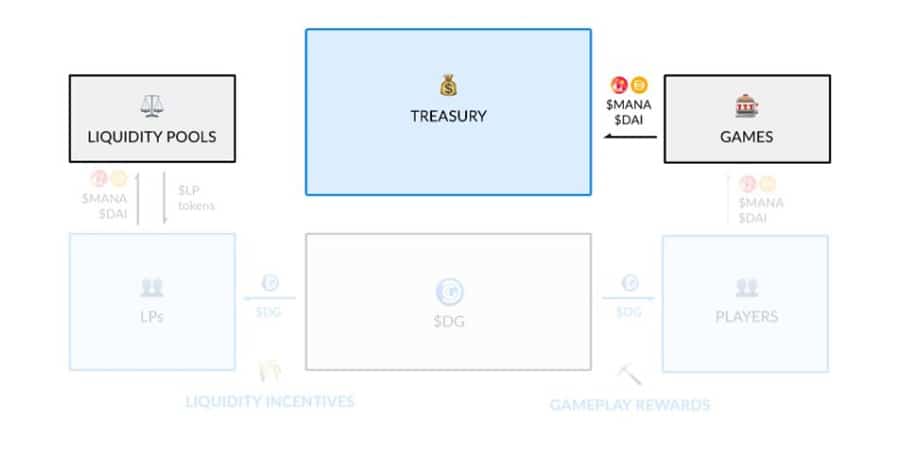 Relationships between various components of the Decentral Games ecosystem. Image via Decentral Games docs
Relationships between various components of the Decentral Games ecosystem. Image via Decentral Games docs This provides the necessary capital for the treasury to function effectively, and also provides users with one means of generating income in the form of DG tokens. In short, the treasury incentivizes users to provide the necessary liquidity that ensures it is always able to pay out on winning wagers in the casinos.
What is the DG Token?
DG is the ticker symbol for the native cryptocurrency used to power everything from governance to mining rewards on the Decentral Games platform. It is an ERC-20 token and has no value or use outside the Decentral Games platform. As the primary utility token of the network holders are able to use DG to propose and vote on governance proposals, to stake and be rewarded with additional DG tokens, and to provide liquidity for the platform.
Users are also rewarded with DG tokens for making wagers on the platform, and for performing other actions such as sitting at the same table as other casino players, or for wearing specific NFT items within the Decentral Games platform.
As stated in the Decentral Games docs:
$DG is a non-refundable functional utility token which will be used as the medium of exchange between participants on the decentral.games ecosystem.” Additionally, “$DG is an integral and indispensable part of the decentral.games ecosystem, because without $DG, there would be no incentive for users to expend resources to participate in activities or provide services for the benefit of the entire ecosystem on the decentral.games ecosystem.
Earning DG tokens on Decentral Games
There are several methods for earning DG tokens on the Decentral Games platform. These include governance incentives, liquidity incentives, and gameplay rewards.
Governance Incentives
Since Decentral Games is a DAO-based project its users are able to propose changes and to vote on those proposals. Each DG holder has a stake in the governance and decisions made for the future good of the platform. All decisions for change are made via a voting mechanism with a specific requirement to propose changes and to pass those proposals. Because of this system the future of the platform will be decided solely by the stakeholders, plus decorum is maintained at all times.
This system of self-regulation is the Governance mechanism used by Decentral Games. Each proposal and vote requires the proposer or voter to own and hold DG tokens in an ERC-20 compatible wallet. Users may stake their tokens to submit a proposal. Based on the rules embedded in the DAO a user is required to hold a minimum of 1% of the circulating supply of DG tokens in order to submit a proposal.
Once a proposal has been submitted there is a 4 day voting window, and 15% of the circulating supply of tokens is required to vote yes to reach a quorum and pass the proposal. Voting power of an individual is determined by the number of DG tokens held, and any user is able to stake their tokens through the governance dashboard.
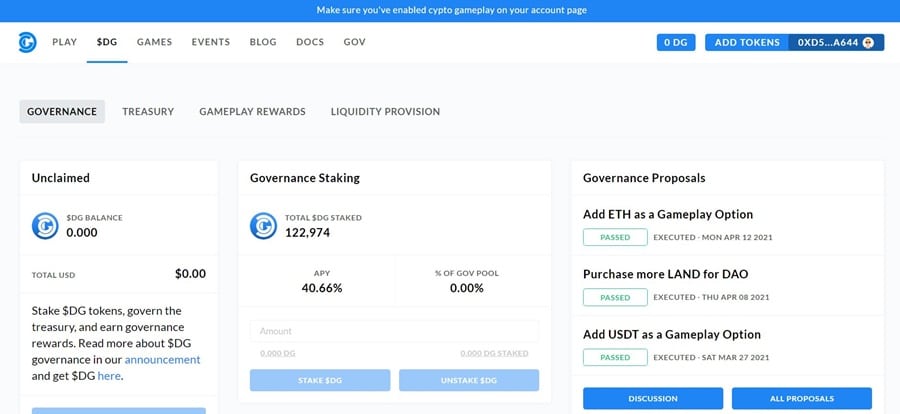 Staking DG is so easy in the Governance Dashboard. Image via Decentral.games
Staking DG is so easy in the Governance Dashboard. Image via Decentral.games Staking tokens in the governance dashboard also entitles the staker to governance rewards. As you can see from the image above as of mid-April 2021 staking DG tokens in the governance dashboards yields better than 40% APY.
It should be noted that issues deliberated and voted on are restricted to those within the platform and its eco-system itself. It does not extend to the management of the staff, assets, or affiliates. It also does not represent any right with respect to Decentral Games itself.
Liquidity Incentives: Mining/Farming DG
The second method used to earn DG tokens is through liquidity incentives. These are considered as mining or farming and they can be done in several different ways, which might expand in the future as well. The primary method now for liquidity mining/farming is by providing liquidity to the ETH-DG liquidity pool on Uniswap. Mining/farming DG follows four basic steps:
- Hold ETH and DG in your Metamask wallet
- Visit Uniswap pair ETH-DG and select "Add liquidity" in the top right, and fill in the amount you wish to deposit.
Then sign 2 transactions:
1. $DG authorization
2. Add liquidity to pool
Once you add liquidity in the pool, you will receive Uniswap-V2 ETH-DG LP tokens, and now you are ready to stake them to start farming DG.
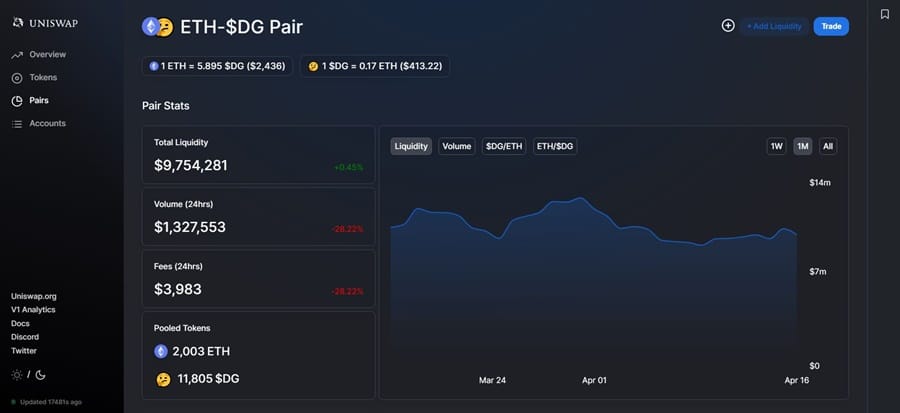 Farm $DG at Uniswap. Image via Uniswap.
Farm $DG at Uniswap. Image via Uniswap. 3. Go to the $DG Liquidity Farming Dashboard and connect your wallet.
Enter the UNI-V2 ETH-DG amount you wish to stake, and select “Stake UNI-V2” on the pool that you provided liquidity to, and sign the transaction. Make sure to turn off any ad blocker extensions.
Now you’re farming!
As you accrue farming revenue in DG, you may claim rewards by clicking the “Claim $DG” button on the left and signing the transaction. You may also withdraw your UNI-V2 ETH-DG tokens from the farming pool at any time to go retrieve your funds on Uniswap
After farming for any amount of time, you may claim the amount of DG your liquidity farmed by selecting "Claim $DG" on the liquidity farming tab.
Gameplay Rewards
Of course one of the most important methods of mining, and one that is likely to take place the most, is mining through gameplay. That’s right, as you enjoy playing your favorite casino games you’ll also be mining and earning DG tokens.
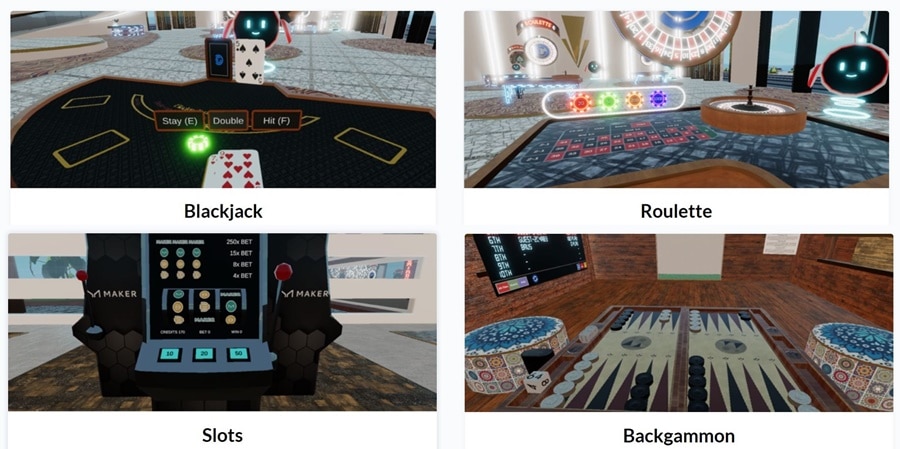 Loads of games and loads of rewards. Image via Decentral.games
Loads of games and loads of rewards. Image via Decentral.games The DG tokens are emitted based on specific activities undertaken during gameplay. Those can include simply placing a wager, sitting with other players at the same table, referring other players to the casino, or having your avatar in the casino wear an NFT item when playing in the casino. Digital assets can be brought into the Decentral Games ecosystem using either DAI or MANA, both of which run on Ethereum, but are faster and cheaper than Ethereum.
Here are the current gameplay rewards:
- Blackjack play-to-mine function - Equation that determines $DG mined per MANA or DAI wagered in blackjack.
- Roulette play-to-mine function - Equation that determines $DG mined per MANA or DAI wagered in roulette.
- Affiliate rate - A bonus rate of 10% for all wagers placed through addresses a player refers.
- Multiplayer bonus - Play-to-mine rate multiplier all players enjoy when playing with 2, 3, and 4 players at the same table. Currently the bonus rate is 10% for 2 players, 20% for 3 players, and 30% for 4 players.
- NFT wearable bonus - Play-to-mine bonus of 10% per active wearables for players wearing a Decentral Games NFT wearable while playing games.
- Available games on Decentral Games
 Gambling in a fully immersive VR experience could beat going to Vegas in the future. Image via Decentral Games blog.
Gambling in a fully immersive VR experience could beat going to Vegas in the future. Image via Decentral Games blog. Currently available games in the Decentral Games Casinos are Blackjack, Roulette, Slots, and Backgammon with 6-player Texas Holdem Poker coming in the second quarter of 2021 and Baccarat planned for the third quarter of 2021. Multiplayer craps is also on the roadmap for release in the first quarter of 2022.
Decentral Games Casinos
Players have the choice of three Decentral Games casinos within Decentraland. These are:
Chateau Satoshi - Located within the Vegas City district in Decentraland the scene features an art deco inspired casino, theatre, nightclub, and stratosphere. The casino is accessible from the most northwestern Decentraland Genesis Plaza and is adjacent to the Vegas City Welcome Plaza.
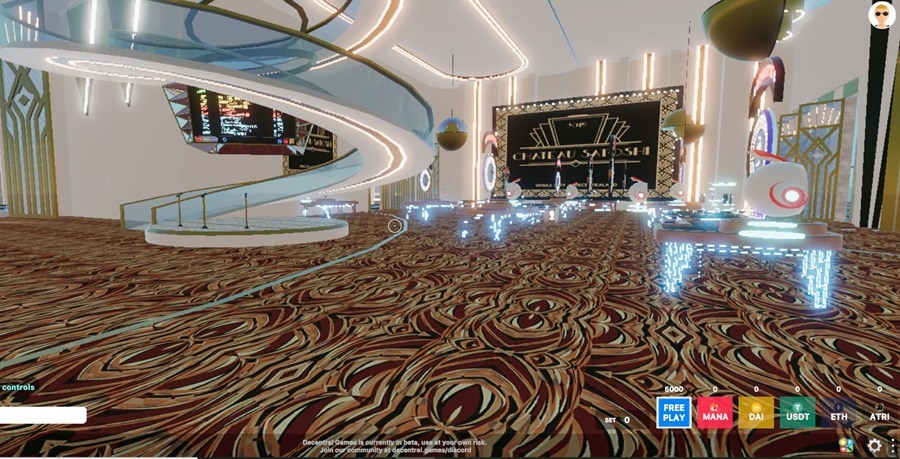 Chateau Satoshi was the first VR casino and is named after Bitcoin's creator. Image via Decentraland.
Chateau Satoshi was the first VR casino and is named after Bitcoin's creator. Image via Decentraland. This was the first casino that opened in conjunction with the December 2020 launch of Decentral Games.
Serenity Island - Located in the Vegas City district in Decentraland. The scene features a massive island that players must climb up to enter, and the structure sports a Monte Carlo-inspired architecture. The building is three stories total featuring two levels of games and a basement club.
Tominoya – This is Decentral Games' most recent and Japanese-themed casino located in the Vegas City district of Decentraland. The scene features two floors with three wings each, and a conference center upstairs where live video streams are held.
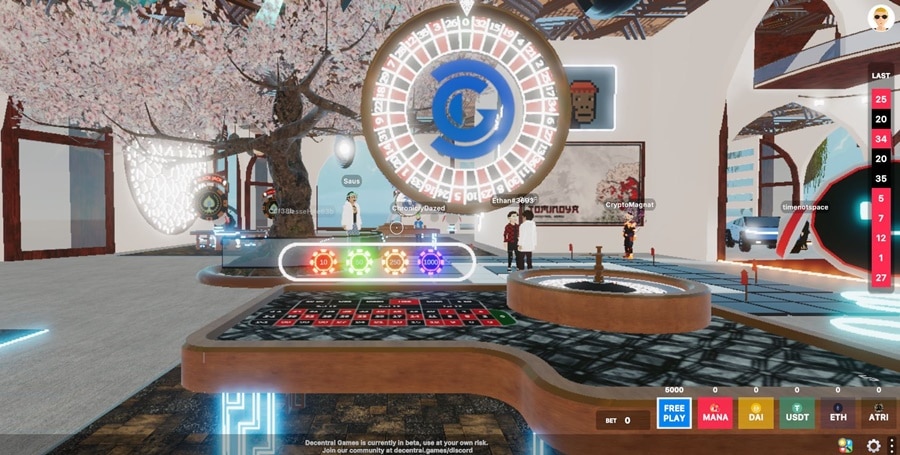 Asian players might be most attracted to the Japanese-themed Tominoya casino. Image via Decentraland.
Asian players might be most attracted to the Japanese-themed Tominoya casino. Image via Decentraland. Real-Life Meets Virtual Life
Decentral Games represents the new age of virtual reality that’s on the verge of breaking out. Online gambling has been expanding in popularity ever since the internet was born, and now blockchain casinos are set to become even more popular thanks to their provably fair model that removes the trust issues that have plagued online gambling to date.
By 2027 it’s been predicted the global online gambling market will reach $127.3 billion. And Decentral Games is now positioned to capture a potentially large slice of that pie.
The combination of immutable trust, 3D virtual worlds, voice chat and now interaction with real avatars should push the Decentra Games casinos to the forefront of the online gambling industry.
One complaint about online casinos is that they’ve always felt empty. Even though they were populated by hoards of avatars to simulate the look of a real-life casino, the lack of interaction with those avatars made online casinos drab and boring.
No more however. Decentral Games has distinguished itself by adding real hosts to its casinos. Starting in February 2021 there have been real people acting as hosts in the casino, helping to boost interaction and expected to increase the time spent in the casinos.
As of April 2021 Decentral Games has a full-time floor manager, just like in a real casino, as well as 20 hosts who work four-hour shifts roaming the casino floor, interacting with guests, and most importantly helping to integrate newcomers into what might be an unfamiliar interface.
Decentral Games and Atari
In March Decentral Games announced a new partnership with an unusual partner, gaming company Atari. The 70s and 80s icon, maker of Pong, Asteroids, and Missile Command is looking to expand into the online gaming space, and will be opening an Atari Casino in May. There they are planning on offering games of luck, games combining skill and luck, and a special game that will be strictly based on skill.
 You can expect Atari Casino to be stunning. Image via Decentral Games blog.
You can expect Atari Casino to be stunning. Image via Decentral Games blog. In addition to adding a new casino and a number of new games, players are also able to use the ATRI token, the native Atari token, to play in all the Decentral Games casinos. That’s true even before the Atari casino opens. That means players now have a choice of MANA, DAI, USDT, ETH, and ATRI when they go to play.
The Decentral Games team is still looking to add new hosts and beta testers for the upcoming casino, and have said interested parties are free to reach out to them on their Discord.
The Decentral Games Team
Miles Anthony is the founder and lead for the Decentral Games project. Prior to creating Decentral Games he was the CEO of Flux Chargers, a portable charger company that Anthony founded while pursuing his Bachelor’s degree in Mathematics/Economics at UCLA.
 Decentral Games founder Miles Anthony. Image via Decentral Games blog.
Decentral Games founder Miles Anthony. Image via Decentral Games blog. Anthony is joined by co-founder Scott de Taboada who is the technical lead for Decentral Games. He was also a co-founder and CTO of Flux Chargers and completed his Bachelor’s of Mathematics of Computation at UCLA.
A third co-founder and the CTO of Decentral Games is Steve Becerra. Prior to coming onboard with Decentral Games in 2019 Becerra was the creator of Digipets on the Ethereum blockchain. He held a number of software engineering and development positions prior to that and he has a Bachelor’s degree in Physics from Sonoma State University.
DG Activity and Tokenomics
When the casinos launched in December 2020 there were 1 million DG tokens created, which will be distributed strategically over a span of 6 years. The tokenomics calls for 62% of the tokens (620,000 DG) to be distributed to the community, 20% of the tokens (200,000 DG) distributed to the development team with 3 years vesting, and 18% of the tokens (180,000 DG) distributed to early investors and participants with a 2 year vesting schedule.
As of April 2021 there are just over 200,000 DG in the circulating supply. This also means it requires just over 2,000 DG to create a proposal and over 30,000 DG to vote yes to any proposal to reach a quorum.
Those 2,000 DG wouldn’t have been considered excessive for creating a proposal back at the start of 2021. At that time DG tokens were valued around $20 each, meaning it would take roughly $40,000 worth of tokens to create a proposal. Not in the reach of everyone certainly, but not out of reach for many.
That’s changed drastically as of April 2021, with DG tokens valued right around $430 as of April 16, 2021. Of course that means it now requires roughly $860,000 worth of tokens to create a proposal. That puts the creation of governance proposals out of the reach of most people.
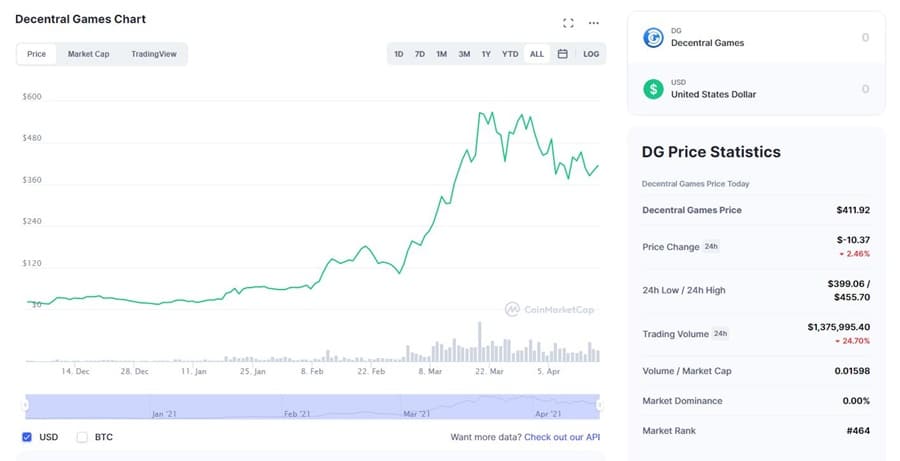 DG has made amazing gains in 2021. Image via Coinmarketcap.com
DG has made amazing gains in 2021. Image via Coinmarketcap.com It’s also possible that the price of DG will retreat substantially more, as it has been falling from the all-time high of $633.42 set on March 29, 2021.
Conclusion
The idea of a blockchain based casino is already a good idea when you consider how popular online gaming has been. It adds a layer of trust that players could never be sure of with online casinos.
However Decentral Gaming is taking that to the next level with the addition of real, live hosts throughout the casinos to welcome guests and help them. Also attractive is the mining of DG simply by playing in the casino. That extra perk can easily turn what would have been a losing session into a winning session.
Now they’ve also added a partner with a globally recognizable brand in Atari, which can only be a good thing, presuming the Atari Casino is as attractive as it’s been hyped.
One concern is that Decentral Games seems to have its fortunes tied to Decentraland. If Decentraland gains in popularity then Decentral Games should also see rising user numbers. However if Decentraland becomes a failed project Decentral Games is likely to have a greater struggle to reach players, and to become successful.
Also impressive in 2021 is the massive increase in the price of DG tokens, however a bear market in cryptocurrencies could easily wipe out much of the gains seen in the first quarter of 2021. Indeed as of April the price of DG tokens is already retreating off its all-time high fairly significantly.
Overall an online casino based on blockchain technology that makes its results provably fair, seems like it can’t possibly lose. People love gambling online, Decentral Games makes it more trustworthy, private, and fun to do so. At this point all that’s missing is the players, but that’s been coming and should continue to grow along with the Decentral Games infrastructure.



